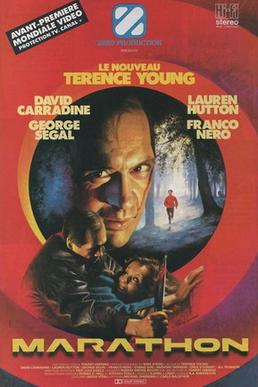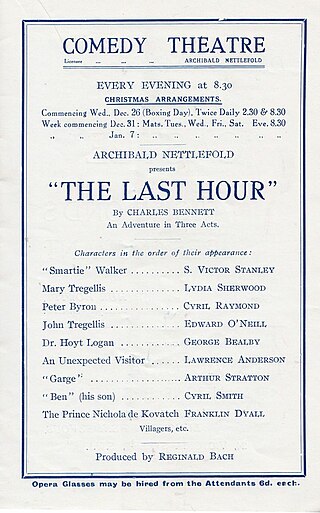Related Research Articles

Debt of Honour is a 1936 British drama film directed by Norman Walker and starring Leslie Banks, Will Fyffe, Geraldine Fitzgerald and Garry Marsh. Based on a story by Sapper, and scripted by Tom Geraghty and Cyril Campion, the film is also known as The Man Who Could Not Forget.
The 33rd Academy Awards, honoring the best in film for 1960, were held on April 17, 1961, hosted by Bob Hope at the Santa Monica Civic Auditorium in Santa Monica, California. This was the first ceremony to be aired on ABC television, which has aired the Academy Awards ever since.

The Last Outpost is a 1935 American adventure film directed by Charles Barton and Louis J. Gasnier and written by Charles Brackett, Frank Partos and Philip MacDonald. It is based on F. Britten Austin's novel The Drum. The film stars Cary Grant, Claude Rains, Gertrude Michael, Kathleen Burke, Colin Tapley, Margaret Swope and Billy Bevan. The film was released on October 11, 1935, by Paramount Pictures.
The Progressive Party was a political party aligned to the Liberal Party that contested municipal elections in the United Kingdom.
Once Bitten is a 1932 British comedy film directed by Leslie S. Hiscott and starring Richard Cooper, Ursula Jeans and Frank Pettingell. It was made at Twickenham Studios as a quota quickie.

Lord Edgware Dies is a 1934 British mystery film directed by Henry Edwards and starring Austin Trevor, Jane Carr, and Richard Cooper. The film was based on the 1933 Agatha Christie novel Lord Edgware Dies.
Designing Women, also known as House of Cards, is a 1934 British drama film directed by Ivar Campbell and starring Stewart Rome, Valerie Taylor and Tyrell Davis. It was shot at Shepperton Studios.

Vintage Wine is a 1935 British comedy film directed by Henry Edwards and starring Seymour Hicks, Claire Luce, Eva Moore and Judy Gunn. The film was made at Julius Hagen's Twickenham Studios, but was released by Gaumont British Distributors which was the largest British film company at the time. The film was loosely based on a German play by Alexander Engels, which also formed the basis of the 1934 West End comedy by Ashley Dukes and Seymour Hicks.
A South Sea Bubble is a 1928 British silent comedy adventure film directed by T. Hayes Hunter and starring Ivor Novello, Benita Hume and Alma Taylor. The screenplay concerns a group of adventurers who head to the Pacific Ocean to hunt for buried treasure. It was made at Islington Studios.
The Eleventh Commandment is a 1924 British crime film directed by George A. Cooper and starring Fay Compton, Stewart Rome and Lillian Hall-Davis. It is based on the play The Eleventh Commandment by Brandon Fleming.
The Great Gay Road is a 1931 British drama film directed by Sinclair Hill and starring Stewart Rome, Frank Stanmore and Kate Cutler.
The Marriage Bond is a 1932 British drama film directed by Maurice Elvey and starring Mary Newcomb, Guy Newall and Stewart Rome. It was made by Twickenham Film Studios.

Run for Your Life is a 1988 Italian-British sport-drama film. It is the last film directed by Terence Young. It was shot in Rome; during the filming Carradine married his third wife, Gail Jensen.
The Man Who Changed His Name is a 1928 British silent mystery film directed by A. V. Bramble and starring Stewart Rome, Betty Faire and James Raglan. It is an adaptation of the play of the same title by Edgar Wallace. It was made at Beaconsfield Studios. The screenplay concerns a young woman who comes to suspect that her husband may in fact be a Canadian fugitive from justice, who murdered his last wife.

What a Life is a 1939 American comedy film directed by Theodore Reed and starring Jackie Cooper, Betty Field, John Howard, Janice Logan, Vaughan Glaser, Lionel Stander, and Hedda Hopper. Written by Charles Brackett and Billy Wilder, the film was released on October 6, 1939, by Paramount Pictures.
Men of Yesterday is a 1936 British drama film directed by John Baxter and starring Stewart Rome, Sam Livesey and Hay Petrie. It was made at Shepperton Studios with sets designed by John Bryan. The screenplay concerns an ex-army officer who organises a gathering of his former comrades while at the same time confronting a personal crisis.

Kissing Cup's Race is a 1930 British drama film directed by Castleton Knight and starring Stewart Rome, Madeleine Carroll and John Stuart. It was made at Walton Studios.
Lest We Forget is a 1934 British drama film directed by John Baxter and starring Stewart Rome, George Carney and Esmond Knight. It was made as a quota quickie at Shepperton Studios.

The Last Hour is a 1928 comedy thriller play by the British writer Charles Bennett. At an inn on the coast of Devon, a secret agent battles a foreign prince trying to smuggle a stolen death ray out of the country.
References
- ↑ Wood p.69